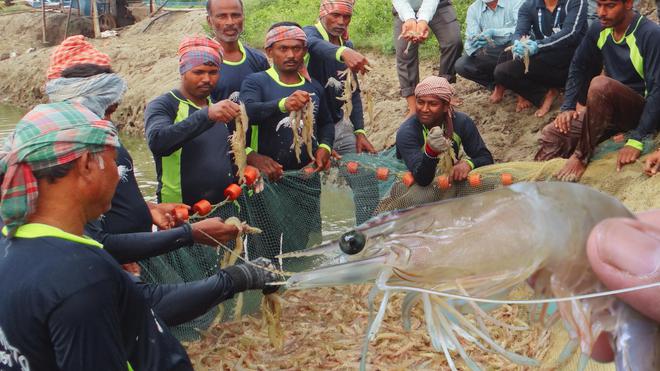In a groundbreaking achievement, aquaculture scientists in India have successfully decoded the genome of the indigenous white shrimp variety, P. indicus. This scientific breakthrough not only propels India towards self-reliance but also promises to significantly boost the country’s export income. With seafood exports currently estimated at ₹42,000 crore, this development could reshape the landscape of India’s aquaculture sector.
Traditionally, India has heavily relied on the exotic and genetically improved Pacific white shrimp, Vannamei, for its aquaculture practices. This imported variety dominates the global export market and contributes to a substantial 70% of India’s seafood exports. However, the newfound focus on decoding the genome of the native P. indicus aims to diversify the shrimp industry, reducing dependency on a single species and fostering growth for Indian shrimp farmers.
Under the ambitious Pradhan Mantri Matsya Sampada Yojana, ₹25.04 crore has been allocated in the initial phase to identify and genetically improve an Indian shrimp variety. The total project fund stands at ₹100 crore, emphasizing the strategic importance of this venture in achieving self-sufficiency and boosting the Indian economy.
Kuldeep Kumar Lal, the Director of the Indian Council of Agricultural Research-Central Institute for Brackishwater Aquaculture (ICAR-CIBA), Chennai, underscores the significance of this initiative as part of the Make in India flagship program. P. indicus is now recognized as a national priority species, marking a pivotal step towards promoting indigenous species over exotic ones.
The successful decoding of the complete genome by CIBA, a first-of-its-kind achievement, opens doors to genetic selection and improvement of the native shrimp. According to Akshaya Panigrahi, the principal scientist at ICAR-CIBA, P. indicus has demonstrated its potential with a production rate of 3-7 tons per hectare per crop, even before domestication. The genetic improvement program aims for a substantial gain of 4-7% per generation, doubling productivity, enhancing feed conversion efficiency, and increasing profitability for farmers.
Dr. Panigrahi envisions that this new species will position India as a pioneer, producing selectively bred Indian white shrimp for global supply. The potential of the genetically improved strain is expected to grow exponentially with the adoption of modern smart farming systems.
In the wake of the COVID-19 pandemic, the need for self-reliance became even more apparent when fish farmers struggled to access mother shrimp for farming, impacting their livelihoods. The decoded genome of P. indicus not only addresses this vulnerability but also sets the stage for a transformative era in India’s aquaculture, highlighting the importance of scientific innovation in fostering resilience and sustainability in the face of global challenges.

